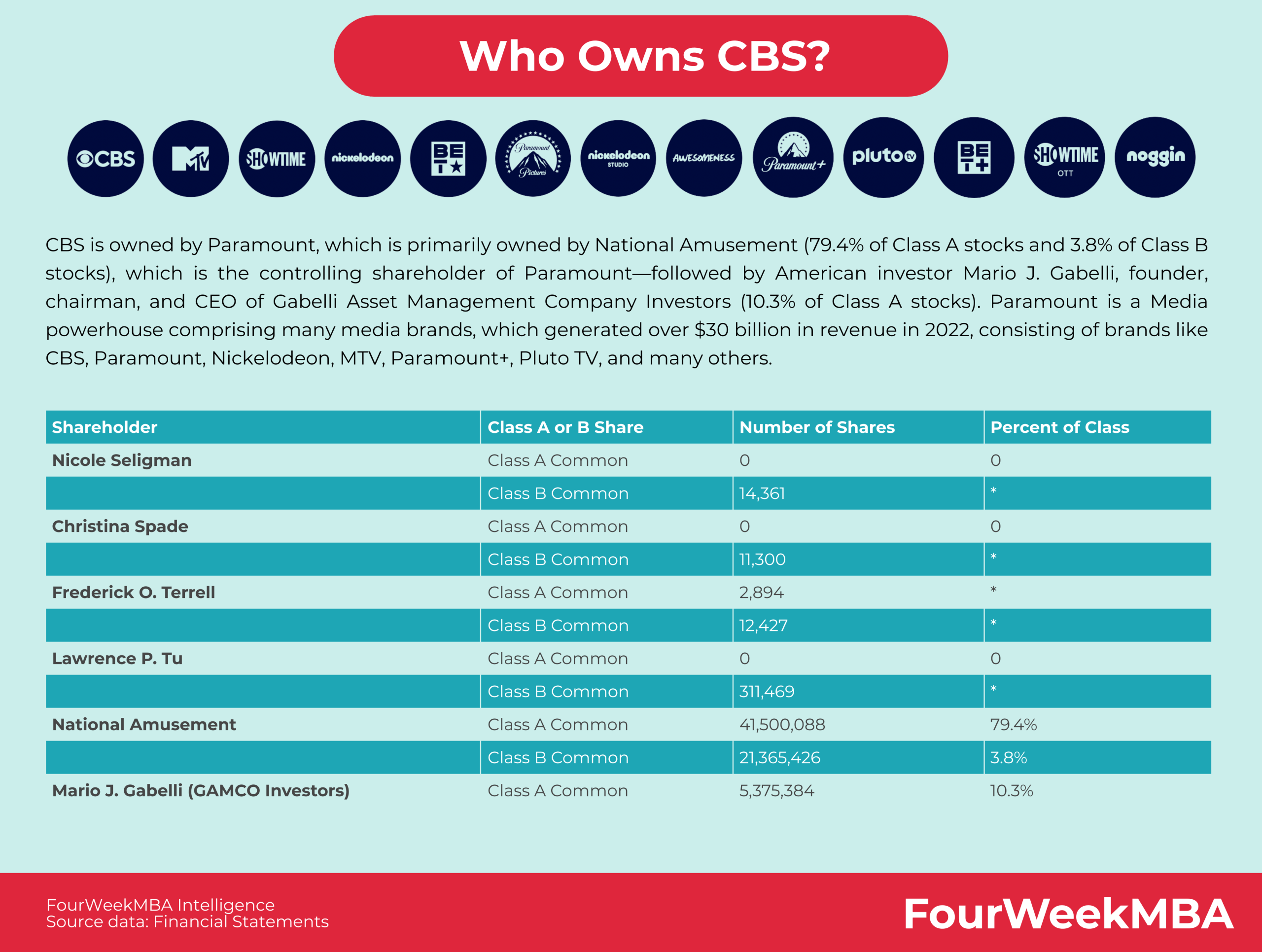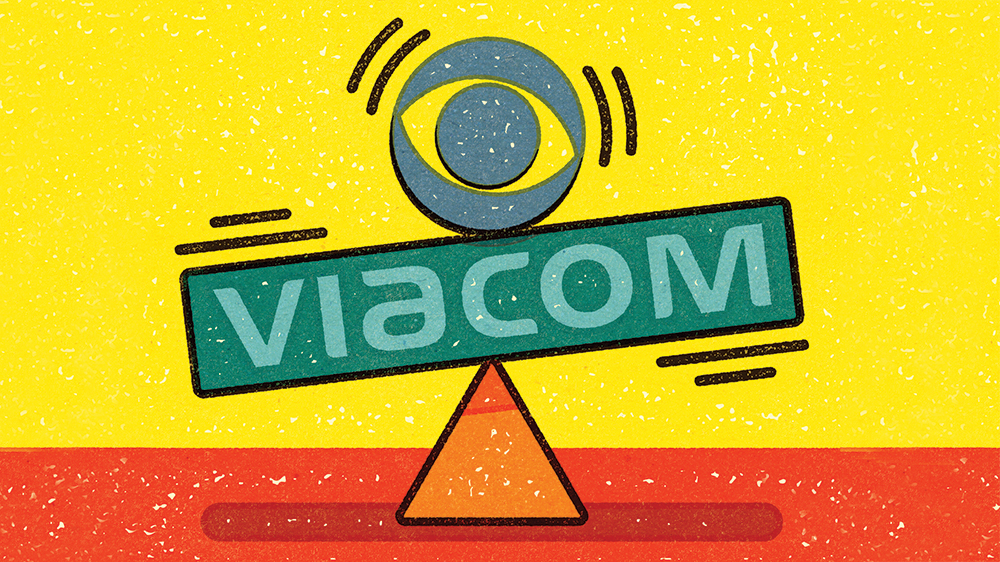Understanding the Ownership of CBS
CBS (Columbia Broadcasting System) is a prominent American commercial broadcast television and radio network. Determining its ownership structure is crucial for understanding the decision-making processes, financial stability, and overall direction of the company.
Currently, CBS is owned by Paramount Global, a media and entertainment conglomerate. Paramount Global was formed in 2019 through the merger of CBS Corporation and Viacom. Prior to the merger, CBS Corporation was a publicly traded company with its shares widely held by institutional investors and individual shareholders.
The ownership of CBS has evolved over the years, reflecting changes in the media landscape and the strategic decisions made by its leaders. Understanding who owns CBS provides insights into the company's operations, content strategy, and its positioning within the competitive media industry.
Who Owns CBS
Understanding the ownership structure of CBS, a prominent American commercial broadcast television and radio network, is crucial for assessing its decision-making processes, financial stability, and overall direction. Here are eight key aspects to consider:
- Parent Company: Paramount Global
- Ownership Structure: Publicly traded subsidiary of Paramount Global
- Majority Shareholder: Shari Redstone (via National Amusements)
- Institutional Investors: BlackRock, Vanguard Group, State Street Global Advisors
- Individual Shareholders: Approximately 1.5 million
- Board of Directors: Oversees the company's strategic direction and management
- Management Team: Responsible for the day-to-day operations of the company
- Employees: Approximately 23,000 worldwide
The ownership structure of CBS has evolved over the years, reflecting changes in the media landscape and the strategic decisions made by its leaders. Paramount Global's ownership provides CBS with access to a wide range of resources and expertise, enabling it to compete effectively in the competitive media industry. The diverse group of shareholders, including institutional investors, individual shareholders, and the Redstone family, brings a variety of perspectives and interests to the company. The Board of Directors and management team play a critical role in guiding CBS's strategic direction and ensuring its long-term success.
Parent Company
Paramount Global, the parent company of CBS, plays a pivotal role in shaping the ownership and operations of the broadcast network. Here are four key aspects to consider:
- Financial Resources: As a large and diversified media conglomerate, Paramount Global provides CBS with access to substantial financial resources. This enables CBS to invest in programming, production, and distribution, enhancing its competitiveness in the media landscape.
- Content Library: Paramount Global owns a vast library of film and television content, which CBS can leverage to enhance its programming lineup and streaming services. This content includes popular franchises such as "Star Trek," "Mission: Impossible," and "SpongeBob SquarePants."
- Distribution Network: Paramount Global has a wide-reaching distribution network, including broadcast television stations, cable channels, and streaming platforms. This allows CBS to distribute its content to a large and diverse audience, maximizing its reach and impact.
- Strategic Direction: Paramount Global's leadership team sets the strategic direction for CBS, guiding its long-term vision and goals. This includes decisions on programming, investment priorities, and market expansion.
The connection between Paramount Global and "who owns CBS" is crucial for understanding the ownership structure, financial stability, and strategic direction of the broadcast network. Paramount Global's ownership provides CBS with a range of resources and expertise, enabling it to compete effectively in the competitive media industry.
Ownership Structure
Understanding the ownership structure of CBS as a publicly traded subsidiary of Paramount Global is crucial for assessing the company's financial stability, accountability, and relationship with its parent company. Here are four key facets to consider:
- Public Ownership: CBS is owned by a diverse group of shareholders, including institutional investors, individual investors, and Paramount Global itself. This public ownership structure means that CBS is accountable to its shareholders and must operate in a transparent and responsible manner.
- Board of Directors: CBS's board of directors is responsible for overseeing the company's strategic direction and management. The board is elected by the shareholders and represents their interests, ensuring that CBS operates in accordance with their wishes.
- Financial Reporting: As a publicly traded company, CBS is required to disclose its financial performance and other material information to the public. This transparency allows investors and analysts to assess the company's financial health and make informed decisions.
- Regulatory Oversight: CBS, as a publicly traded subsidiary of Paramount Global, is subject to various regulatory requirements and oversight from government agencies such as the Securities and Exchange Commission (SEC). This oversight ensures that CBS complies with applicable laws and regulations.
The publicly traded subsidiary structure of CBS under Paramount Global's ownership provides a balance between the benefits of public ownership, such as transparency and accountability, and the strategic guidance and support of a large parent company. This structure allows CBS to operate independently while leveraging the resources and expertise of Paramount Global.
Majority Shareholder
Identifying the majority shareholder of CBS, Shari Redstone, and her holding company, National Amusements, is essential for understanding the power dynamics and decision-making processes within the company. As the largest shareholder, Redstone wields significant influence over CBS's strategic direction, management appointments, and overall operations.
Redstone's ownership stake in CBS stems from her father, Sumner Redstone, who was the founder and former chairman of both CBS and National Amusements. Upon Sumner Redstone's passing in 2020, Shari Redstone inherited his controlling interest in both companies, solidifying her position as the majority shareholder of CBS.
The practical significance of understanding Shari Redstone's majority ownership lies in her ability to shape CBS's long-term vision, influence key decisions, and appoint board members who align with her strategic objectives. As such, investors, analysts, and industry observers closely monitor Redstone's moves and statements to gauge potential shifts in CBS's strategy and performance.
In summary, the connection between "Majority Shareholder: Shari Redstone (via National Amusements)" and "who owns CBS" highlights the importance of identifying the largest shareholder and their potential influence on a company's decision-making and overall direction.
Institutional Investors
Institutional investors play a significant role in the ownership structure of CBS. These entities, which include investment management firms, pension funds, and insurance companies, hold large blocks of CBS shares and exert considerable influence over the company's decision-making.
- Ownership Concentration: Institutional investors, such as BlackRock, Vanguard Group, and State Street Global Advisors, collectively own a substantial portion of CBS's outstanding shares. This concentration of ownership gives them a strong voice in shaping the company's strategic direction and management.
- Long-Term Perspective: Institutional investors typically have a long-term investment horizon, which means they are less likely to engage in short-term speculative trading. This stability provides CBS with a solid base of support and allows the company to focus on long-term growth strategies.
- Active Engagement: Institutional investors are known for actively engaging with the companies they invest in. They often meet with management teams, review financial performance, and provide feedback on strategic decisions. This engagement ensures that CBS's management is accountable to a diverse group of shareholders.
- Influence on Corporate Governance: Institutional investors can influence corporate governance practices at CBS. They may vote on board member nominations, executive compensation packages, and other matters that affect the company's governance structure. This influence helps to ensure that CBS operates in a transparent and responsible manner.
The involvement of institutional investors in the ownership of CBS highlights the importance of understanding the role of large shareholders in shaping a company's direction. Their long-term perspective, active engagement, and influence on corporate governance make them key stakeholders in the CBS ecosystem.
Individual Shareholders
The significant number of individual shareholders in CBS, approximately 1.5 million, underscores theownership base of the company. Understanding the role and collective influence of these individual shareholders is crucial for assessing the overall ownership structure of CBS.
- Diversification of Ownership: The large number of individual shareholders contributes to the diversification of CBS's ownership structure. This reduces the risk of any single shareholder or group of shareholders exerting excessive control over the company.
- Long-Term Investment: Individual shareholders often have a long-term investment horizon, which provides CBS with a stable base of support. They are less likely to engage in short-term speculative trading, allowing the company to focus on long-term growth strategies.
- Influence on Shareholder Value: Individual shareholders can influence CBS's share price and overall shareholder value through their collective actions. They can vote on key issues, such as the election of directors and executive compensation, which can impact the company's performance and financial health.
- Engagement with Management: Some individual shareholders engage with CBS's management team, providing feedback and input on the company's strategic direction and operations. This engagement helps to ensure that the company is responsive to the needs and concerns of its shareholders.
The involvement of a large number of individual shareholders in CBS's ownership structure is a reflection of the company's strong brand recognition and public appeal. These shareholders play a vital role in the governance and overall success of CBS.
Board of Directors
Understanding the composition and role of the board of directors is crucial in examining "who owns CBS." The board is responsible for guiding the company's strategic direction, ensuring sound management practices, and representing the interests of shareholders.
- Board Composition: The CBS board of directors comprises a diverse group of individuals with expertise in various fields, including media, finance, and technology. This diversity of perspectives and experiences enables the board to make informed decisions that benefit the company and its shareholders.
- Strategic Planning: The board plays a pivotal role in developing and overseeing CBS's long-term strategic plan. They establish the company's overall vision, mission, and goals, ensuring alignment with the interests of shareholders and stakeholders.
- Management Oversight: The board is responsible for appointing and overseeing the management team, including the CEO. They regularly review the performance of the management team and provide guidance and support to ensure the company's success.
- Risk Management: The board is responsible for identifying and mitigating potential risks that could impact the company's operations and financial performance. They oversee the company's risk management framework and ensure that appropriate measures are in place to protect shareholder value.
In summary, the board of directors plays a critical role in "who owns CBS" by providing strategic guidance, overseeing management, and safeguarding the interests of shareholders. The board's composition, responsibilities, and expertise contribute to the effective governance and long-term success of CBS.
Management Team
The management team plays a crucial role in the context of "who owns CBS." They are responsible for executing the strategic direction set by the board of directors and overseeing the day-to-day operations of the company.
The management team's decisions and actions directly impact the company's financial performance, brand reputation, and overall success. They are responsible for managing the company's resources, including its employees, finances, and technology, to achieve the goals set by the board of directors.
Understanding the role of the management team is essential for assessing the overall ownership of CBS. The management team is accountable to the board of directors and, ultimately, to the shareholders. They are responsible for ensuring that the company operates in a manner that maximizes shareholder value while also fulfilling its obligations to stakeholders, including employees, customers, and the community.
In summary, the management team is a key component of "who owns CBS" as they are entrusted with the responsibility of executing the company's strategic vision and managing its day-to-day operations. Their decisions and actions have a direct impact on the company's success and the value of its shares.
Employees
The workforce of CBS, comprising approximately 23,000 employees worldwide, plays a critical role in the company's operations and success, making them an integral part of "who owns CBS." Their contributions directly impact the quality of the content produced, the efficiency of the operations, and ultimately, the value of the company.
CBS employees are responsible for various aspects of the company's operations, including content creation, production, distribution, and marketing. Their expertise and dedication ensure that CBS delivers high-quality programming and maintains its position as a leading media and entertainment company.
Understanding the significance of CBS employees as part of "who owns CBS" highlights the importance of a skilled and motivated workforce in driving the success of any organization. Their contributions extend beyond their specific roles, as they are also brand ambassadors and play a vital role in shaping the company's culture and reputation.
Frequently Asked Questions about "Who Owns CBS"
This section addresses common questions and misconceptions surrounding the ownership structure of CBS.
Question 1: Who is the ultimate parent company of CBS?
CBS is currently owned by Paramount Global, a global media and entertainment conglomerate formed in 2019 through the merger of CBS Corporation and Viacom.
Question 2: Is CBS a publicly traded company?
Yes, CBS is a publicly traded subsidiary of Paramount Global. Its shares are traded on the Nasdaq Stock Market under the ticker symbol "PARA."
Question 3: Who is the largest shareholder of CBS?
Shari Redstone, through her holding company National Amusements, is the majority shareholder of CBS, with a controlling interest of approximately 79%.
Question 4: Do institutional investors play a significant role in CBS's ownership?
Yes, institutional investors, such as BlackRock, Vanguard Group, and State Street Global Advisors, collectively own a substantial portion of CBS's outstanding shares and exert considerable influence over the company's decision-making.
Question 5: How many individual shareholders does CBS have?
CBS has approximately 1.5 million individual shareholders, reflecting the diverse ownership base of the company.
Question 6: What is the role of the CBS board of directors?
The CBS board of directors is responsible for overseeing the company's strategic direction, ensuring sound management practices, and representing the interests of shareholders. The board comprises a diverse group of individuals with expertise in various fields, including media, finance, and technology.
Summary: Understanding the ownership structure of CBS is crucial for assessing the company's decision-making processes, financial stability, and overall direction. CBS's ownership structure involves a combination of institutional investors, individual shareholders, and the Redstone family, with Paramount Global serving as the ultimate parent company.
Transition: This comprehensive overview of "who owns CBS" provides insights into the various entities and individuals involved in the ownership and governance of the company. The next section delves into the historical context and evolution of CBS's ownership structure.
Understanding "Who Owns CBS"
Examining the ownership structure of CBS requires a comprehensive approach. Here are five key tips to guide your analysis:
Tip 1: Identify the Parent Company
Determine the ultimate parent company of CBS. This provides insights into the broader corporate structure and access to resources.
Tip 2: Examine the Ownership Structure
Analyze the distribution of ownership, including institutional investors, individual shareholders, and the Redstone family. This reveals the balance of power and potential influence over CBS.
Tip 3: Research Majority Shareholders
Identify the majority shareholder(s) and their holding companies. This helps understand the level of control and potential decision-making impact.
Tip 4: Consider the Role of the Board of Directors
Examine the composition and responsibilities of the CBS board of directors. This provides insights into the oversight and strategic guidance provided to the company.
Tip 5: Analyze Financial Disclosures
Review CBS's financial disclosures, including shareholder reports and SEC filings. This information sheds light on ownership changes, dividend payments, and other relevant financial aspects.
Summary: By following these tips, you can gain a deeper understanding of "who owns CBS" and its implications for the company's decision-making, financial stability, and overall direction.
Transition: This analysis of CBS's ownership structure provides valuable insights into the various entities and individuals involved. The next section delves into the historical context and evolution of this ownership structure.
Understanding "Who Owns CBS"
Examining the ownership structure of CBS reveals a complex interplay of institutional investors, individual shareholders, the Redstone family, and Paramount Global as the ultimate parent company. The diverse ownership base provides stability and balance while allowing for strategic guidance and oversight.
Understanding "who owns CBS" is crucial for assessing the company's decision-making processes, financial stability, and overall direction. The ownership structure has evolved over time, reflecting changes in the media landscape and the strategic decisions of its leaders. As CBS navigates the ever-changing media industry, its ownership structure will continue to be a key factor shaping its future success.
Unveiling Donald Trump's Golf Prowess: Surprising Insights
Unveiling Joseph Sikora's Cinematic Legacy: A Treasure Trove Of Discoveries
Uncover The Secrets Of Catherine O'Hara's Net Worth



ncG1vNJzZmiumJq8b7%2BSZ6ysZaeawLV5kWeYppmqpLuiw9JnmqilX6y1sHnOsKWsZZOXwG%2B006aj